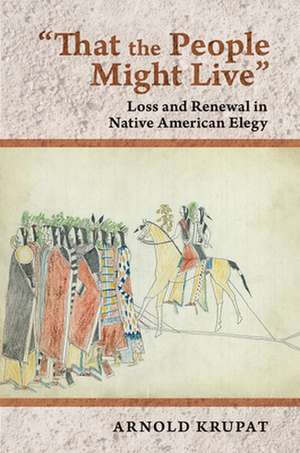"That the People Might Live" – Loss and Renewal in Native American Elegy
Autor Arnold Krupaten Limba Engleză Hardback – 14 noi 2012
Krupat covers a variety of oral performances of loss and renewal, including the Condolence Rites of the Iroquois and the memorial ceremony of the Tlingit people known as koo'eex, examining as well a number of Ghost Dance songs, which have been reinterpreted in culturally specific ways by many different tribal nations. Krupat treats elegiac "farewell" speeches of the eighteenth and nineteenth centuries in considerable detail, and comments on retrospective autobiographies by Black Hawk and Black Elk.
Among contemporary Native writers, he looks at elegiac work by Linda Hogan, N. Scott Momaday, Gerald Vizenor, Sherman Alexie, Maurice Kenny, and Ralph Salisbury, among others. Despite differences of language and culture, he finds that death and loss are consistently felt by Native peoples both personally and socially: someone who had contributed to the People's well-being was now gone. Native American elegiac expression offered mourners consolation so that they might overcome their grief and renew their will to sustain communal life.
Preț: 423.54 lei
Nou
Puncte Express: 635
Preț estimativ în valută:
81.06€ • 84.31$ • 66.92£
81.06€ • 84.31$ • 66.92£
Carte tipărită la comandă
Livrare economică 15-29 aprilie
Preluare comenzi: 021 569.72.76
Specificații
ISBN-13: 9780801451386
ISBN-10: 0801451388
Pagini: 256
Dimensiuni: 152 x 229 x 25 mm
Greutate: 0.48 kg
Editura: MB – Cornell University Press
ISBN-10: 0801451388
Pagini: 256
Dimensiuni: 152 x 229 x 25 mm
Greutate: 0.48 kg
Editura: MB – Cornell University Press
Descriere
Krupat surveys the traditions of Native American elegiac expression over several centuries, finding that despite differences of language and culture, death and loss are consistently felt by Native peoples both personally and socially.
